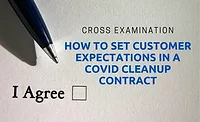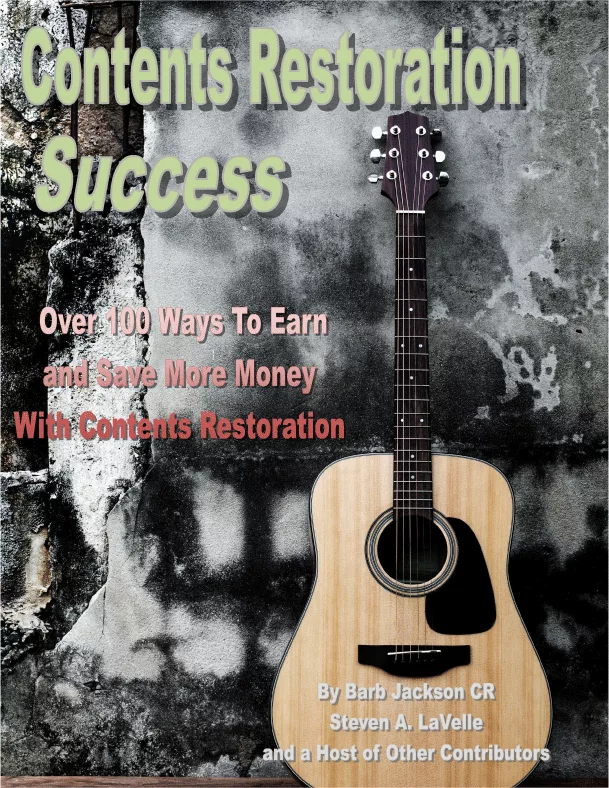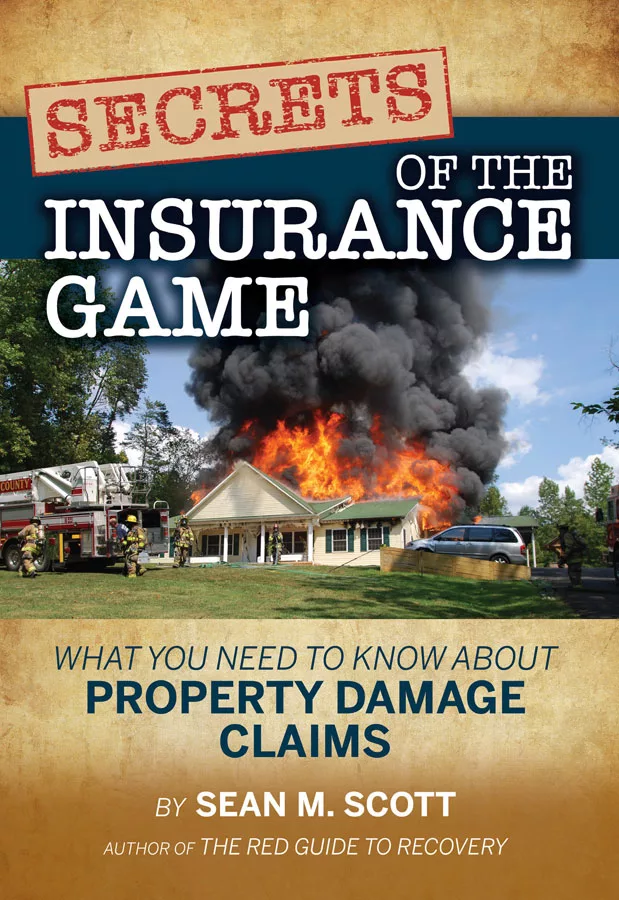The “Contract Wars” – Part III
Cover Your Backside
In the first part of this series (October 2013), I explained what a contract is, how to draft and interpret contracts, how bad contracts can lead to collections nightmares, and the importance of revisiting contracts on an annual basis to confirm that they comply with new law. In the second part of this series (December 2013), I explained “home improvement” laws, some of the special rules that apply to contracts for residential work, and the most valuable legal parts (MVLP’s) of a restoration contract. In this part, I show how a contract can be a vital risk management tool.
Covering your backside is as much art as it is science. Knowing the law is not enough. It requires an understanding of how restoration projects play out and the obstacles commonly faced by restorers. Drafting an enforceable restoration contract that provides good protection to the restorer requires a series of delicate judgment calls.
LIMITATIONS ON LIABILITY
The well-drafted restoration contract is not excessively verbose, but does include fair but broad limits on the restorer’s liability.
The contract should disclaim liability for acts or omissions of third parties such as environmental consultants and design professionals (architects and engineers). It should exclude liability for undisclosed hazards known by the owner, for pre-existing damage unrelated to the loss the restorer was hired to address, for code violations and for damage caused by the customer or the customer’s vendors. Some states also allow caps on the total amount of liability if it has some rational relationship to the size of the job.
Limits of liability should only be drafted by an experienced attorney because they are subject to intense scrutiny by the courts, especially for residential jobs. They will generally be unenforceable if they are found to be “adhesion contracts,” if they are unclear or vague, inconspicuous or illegible, or the result of fraud. Contracts are unenforceable to the extent they seek to absolve the drafter of the contract from his own malicious or criminal acts, acts known to be unlawful, or his own recklessness.
Contracts which purport to provide indemnity against liability for damages for death or bodily injury to persons, injury to property, or any other loss, damage or expense arising from the sole negligence or willful misconduct of the contractor, or his independent contractors who are directly responsible to him, are against public policy and are void and unenforceable.
Similarly, a limit of liability will not be enforced if it thwarts the primary purpose of the contract. For example, a mold remediation contract that states the remediator is not responsible for mold would be unenforceable for several legal reasons. For one, it is an “illusory contract.” That is, the customer’s benefit of the bargain is an illusion. To be enforceable, all contracts must have “consideration,” which is a bargained-for exchange. The experienced legal practitioner will draft contracts in a way to assure that the limits of liability are not so broad as to make the contractor’s promise so insubstantial that it would not impose any obligation on the contractor.
An “adhesion contract” is formed where a person with superior bargaining power pressures the other party into a contract with unfair or oppressive terms. Restoration contractors are sometimes accused of making adhesion contracts. Adhesion contracts are generally standardized forms offered to consumers on a “take it or leave it” basis. If the consumer has no meaningful opportunity to negotiate the contract, he is stuck (adhered) to it.
Expect courts to be sympathetic to consumers who sign restoration contracts with overly-aggressive limits of liability, especially on residential emergency service jobs. Just think of the poor, little old lady standing knee-deep in sewage at 3 a.m. being abused by a charlatan contractor. She will remind the judge of his Nana and he will unleash all unholy fury on you.
The prudent restorer trains all staff members never to say “the contract is not negotiable.” This is not to say that the restorer must comply with every request, just give an opportunity to negotiate and agree to reasonable modifications (with the approval of management, of course). Consumers often ask for trivial changes to contracts. Restorers should agree to them readily and encourage them to be handwritten on the contract itself. Handwritten modifications are given great weight in court. In fact, many people don’t even read the pre-printed text, they just skip to what was handwritten. Handwritten modifications on a contract show not only that it was negotiable, but it was negotiated. It also shows the consumer read the contract, depriving them of the age-old excuse “I didn’t read it.” Take that, Nana!
INDEMNITY PROVISIONS
Indemnity means compensation in money or property for a loss suffered. It also means a contract to save another from the legal consequences of the conduct of one of the parties or of a third person. It is an agreement where one party agrees to secure another against an anticipated loss or damage. Liability insurance policies are examples of indemnity agreements. The insurer is the indemnitor, and the insured is the indemnitee.
Restoration contracts can include indemnity clauses, where, for example, the customer agrees to indemnify the contractor for harm that results from the customer’s failure to keep unauthorized persons out of the work area, or for the errors or omissions of third parties, such as environmental consultants.
Judicial approaches to indemnity have shifted over the years, but one rule holds firm: If there is an indemnity agreement, the actual words of that agreement will control. The beloved California Appellate Justice William Bedsworth wrote: “If the first rule of medicine is ‘Do no harm,” the first rule of contracting should be ‘Read the documents.’”
ARBITRATION PROVISIONS
A restorer may elect to include an arbitration clause in a restoration contract. Arbitration is process where two or more parties submit their dispute to a third party (arbitrator) out of court. Most arbitrators are retired judges, but that is not a requirement.
Arbitration is like a trial in the sense that witnesses testify, the parties can make objections, and the arbitrator makes rulings and issues an award. But there is no jury. If the parties have agreed in writing to binding arbitration, they waive the right to appeal.
Arbitration is not to be confused with mediation, which is an informal settlement conference. No rulings are made in mediation. Some courts order parties to mediation, but typically, it is a voluntary process. If both sides appear in good faith, it can be an extremely effective process of dispute resolution.
Arbitration was the rage in the 80’s and early 90’s when courts were backed up four and five years or more on cases. One advantage of arbitration is that it can lead to a quicker resolution because it is administered by a private, for-profit service. The rules of evidence are relaxed, so there are fewer formalities, fewer filings, and less paperwork. This is all designed to streamline and economize the process. Unfortunately, it can be hugely expensive. For this reason, arbitration has fallen out of favor in some circles.
Being an arbitrator is a sweet gig. Arbitrators get paid for their time––some up to $1,000 per hour or more, thank you very much. Some arbitrators have been accused of being in “no hurry” to finish a case. I have seen arbitrators fail to expedite the process and allow the lawyers and witnesses to drone on and on. This becomes extremely costly, not just in terms of the arbitrator’s fees, but in terms of additional attorney’s fees and additional downtime and disruption for the parties. Every time the arbitrator takes a call, reads a letter or decides an issue, it is billable time. Most good arbitrators are part of arbitration services that charge hefty administrative fees to cover the huge overhead from renting entire upper floors of Class A space in metropolitan centers. Have I talked you out of it yet?
If not, consider this. Filing a lawsuit in court requires a filing fee of a few hundred dollars. Jury fees are about $150 per day, and motions usually cost about $40. Other than that, the services of a court are practically “free” to the litigants (thanks to your tax dollars). Recent nationwide budget cuts have reduced the size of court staffs and increased the caseload of many judges. The efficiency of the late 90’s and early 2000’s seems to have waned. In Riverside County, CA, each civil judge currently carries a caseload upwards of 1,500 cases. To say they are motivated to be efficient would be an understatement. Most of them cut to the chase without all the clowning around that happens in some arbitration proceedings. A judge’s paycheck is not determined by whether you ever “choose” to use his services again. Further, when someone gets served with a lawsuit with a summons issued by a court, they tend to take it more seriously than an arbitration demand.
On the other hand, the recent backlog of court cases is a factor that favors arbitration, which can be considerably faster. Waiving the right to appeal is a double-edged sword. Restorers’ insurance companies want the right to appeal and I have never seen them invoke an arbitration clause in a restoration agreement. Plaintiffs don’t usually want arbitration because it is much more difficult to inflame the passions of a retired judge than a jury.
However, in some jurisdictions, juries are known for distrusting contractors, so arbitration can be an attractive option. Arbitration is not in a public venue, so there is no public record. If you elect to include an arbitration clause, consider adding a confidentiality clause to keep the whole thing under wraps. An arbitration clause can also include an agreement about the minimum qualifications of the arbitrator (e.g., 10 years construction law experience), so the case is more likely to be decided by someone with expertise in the general subject matter of the case.
Probably the best part about arbitration is that there is less exposure to a run-away damages award. Talk with your lawyer about the risks, advantages and expenses of having an arbitration clause. The majority of my clients do not have them, and the ones that do almost never invoke them (i.e., the parties ignore them and simply go to court). So the clause becomes useless clutter on the contract.
So cover your backside, but do it artfully. And don’t try to cover it so much that you end up burning it.
Looking for a reprint of this article?
From high-res PDFs to custom plaques, order your copy today!








